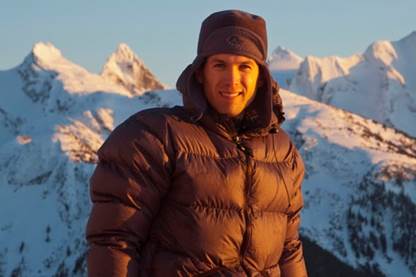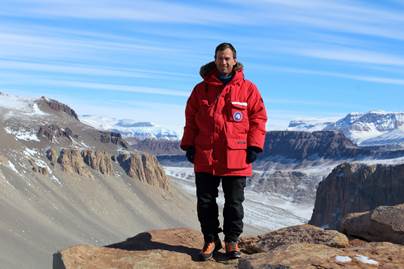Dr. Jon Toner was recently appointed as a Research Assistant Professor with Earth and Space Sciences and the UW Astrobiology Program. Here in his faculty profile he describes his career path and research interests, and introduces us to the concept of “Type-2 suffering”!

Background
My academic journey began as a Physics major attending The College of New Jersey. Upon graduating, I realized that I enjoyed the natural world as much as I did the challenge of pure physics. So why not combine the two and study Geo-Physics? Motivated by UW’s strong geoscience reputation, and its proximity to glaciated mountains, I applied and was accepted to the University of Washington. I’ve never left since! Under my graduate advisor, Ronald Sletten, I did field work in the McMurdo Dry Valleys of Antarctica, studying the geochemistry of soils there and their implications for past glacial events. This research was a gateway to studying planetary science and astrobiology because the Dry Valleys are arguably the best Mars analog environment. After obtaining my PhD, I worked as a postdoc for Prof. David Catling, investigating salt and water chemistry on Mars. During this time my research interests expanded, and so did my funding sources. Given my success in research, and my love of the NW, it was a natural step to become a research assistant professor in Fall 2017.
Research interests
My research interests focus on liquid water formation in extreme environments on Earth and beyond. Liquid water is essential for life-as-we-know-it, so understanding its formation and properties in planetary environments is key for astrobiology. I approach my research using a combination of laboratory work, computer simulations, and field studies in analog environments. My current interests focus on three main areas: the formation and properties of liquid water on Mars, the habitability of oceans in icy moons, and prebiotic chemistry on early Earth. For the Mars research, I am interested in what surface salts indicate about past/present liquid water. I recently did field work in the McMurdo Dry Valleys this year, investigating how liquid water forms in Earth’s coldest desert, and if similar processes could occur on Mar. For the icy moons research, I’m looking at the internal structure of moons, as well as the composition and habitability of Enceladus’ ocean. The early Earth research examines the environmental fate of cyanide, which is motivated by origin of life schemes that suggest cyanide was the key ingredient for life. Given the central importance of water for life, my research interests in astrobiology continue to expand.

Hobbies
My main passion is the outdoors and mountaineering in particular, which is the real reason why I moved to Seattle in the first place. Over time, I’ve gone on countless climbs and expeditions, covering technical ground, “bushwhacking”, and type-2 suffering (fun afterwards, not during). These days when I climb a peak, I’ve probably climbed it before, and nearly all of the surrounding mountains too. My other interests include hiking, trail running, “mountain running”, and world travels. When not in the mountains, I can be found in our Wedgewood home with my wife Lisa. My most recent adventure is being a parent! Lisa and I welcomed our daughter Ellie into the world on March 30th.
